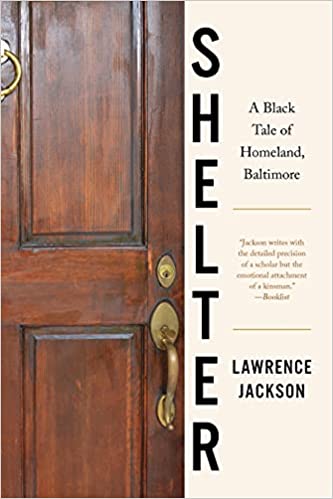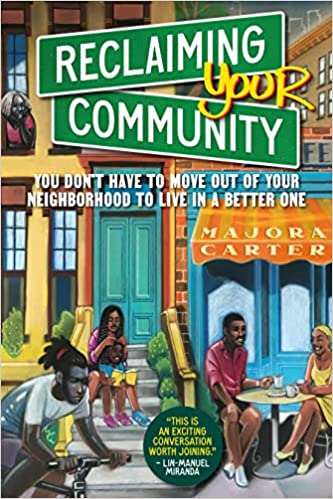“You Just Have to Read This…” Books by Wesleyan Authors Jackson ’90, Carter ’88
In this continuing series, Annie Roach ’22 and Madi Mehta ’24 review alumni books and offer a selection for those in search of knowledge, insight, and inspiration. The volumes, sent to us by alumni, are forwarded to Olin Library as donations to the University’s collection and made available to the Wesleyan community.
 Lawrence Jackson ’90, Shelter: A Black Tale of Homeland, Baltimore (Graywolf Press, 2021)
Lawrence Jackson ’90, Shelter: A Black Tale of Homeland, Baltimore (Graywolf Press, 2021)
After accepting a teaching job at Johns Hopkins, professor of English and history Lawrence Jackson found himself doing something that many people experience in their adult life—returning home. But Jackson, who grew up in Baltimore, experienced a homecoming rife with complexity. The neighborhood to which he moved as an adult, Homeland, has always been overwhelmingly white and has a layered history of slavery, racial covenants, and exclusivity, making it dramatically different from his inner-city upbringing in West Baltimore. In Shelter, Jackson unravels the tension that he must grapple with as a Black resident of the neighborhood, suggesting that claiming the area as his own has the potential for both empowerment and disempowerment. In other words, Jackson wrestles with the question of what it means to call a place home that has historically been reserved for people that don’t look like him or his ancestors, and how the concept of “home” can be redefined in the context of Homeland’s exclusionary past.
Jackson blends his personal history and the history of Baltimore at large to make for a captivating story that reads both as a beautiful memoir and as a seriously-studied historical document. His writing is incisive and keen, bursting with humor and passion. With a lovely balance of creative, memory-driven scenes and relevant historical context (which reaches into American cities in which his ancestors dwelled far before Baltimore), he manages to pull the reader into his world and the world of Baltimore, revealing how the roots of who someone is often depend so strongly on place and its fraught relationship to race. Whether readers have experienced the city of Baltimore or not, after reading Shelter, they will feel a strong pull to and fascination about it, due to Jackson’s careful, lovingly-crafted story.
Lawrence Jackson ’90 is the Bloomberg Distinguished Professor of English and History at Johns Hopkins University. Along with Shelter, he is the author of the books Chester B. Himes: A Biography; The Indignant Generation: A Narrative History of African American Writers and Critics; Ralph Ellison: Emergence of Genius, 1913-1952; and My Father’s Name: A Black Virginia Family after the Civil War. He is also the founder of the Billie Holiday Project for Liberation Arts, which was designed to create opportunities for enhanced intellectual and artistic relations between Johns Hopkins and the city of Baltimore.
 Majora Carter ’88, Hon. ’13, Reclaiming Your Community: You Don’t Have to Move Out of Your Neighborhood to Live in a Better One (Berrett-Koehler Publishers, Inc.)
Majora Carter ’88, Hon. ’13, Reclaiming Your Community: You Don’t Have to Move Out of Your Neighborhood to Live in a Better One (Berrett-Koehler Publishers, Inc.)
Growing up in the South Bronx, Majora Carter, like many young people born into “low-status communities,” defined success as the distance she could put between herself and her home. It wasn’t until she grew up and uncovered the extent of the talent and beauty of her very own neighborhood that she realized the fundamental flaw in this mindset. In Reclaiming Your Community, Carter recalls watching a local community create an award-winning park from what was previously considered little more than a dumping ground. Why, she asks, can’t more American communities like the one she was raised in experience a similar transformation on their own terms?
Carter urges those who have grown up in low-status communities—places that are often incorrectly written off as problems to society—to return and reclaim their homes, and calls for the greater public to examine and reconsider the way they think about these communities. Interweaving stories from her own personal history and experience told with incredible care and vulnerability, Carter outlines a development strategy to help these communities break out of economic stagnation. She encourages developing mixed-income housing to fortify the economic ecosystem, instructing owners on how to cultivate long-term property value, and building “third spaces” (restaurants, bookstores, cafes, etc). A community, she argues, has all it needs within itself. It’s simply a matter of putting an end to the crippling brain drain and devising a step-by-step plan that works and using talent-retention strategies that are virtually identical to the ones that companies use. As Carter says, “When you’ve got top performers at your company, you do what you [have to] do to keep them” and the same goes for these overlooked communities brimming with talent and possibility.
Majora Carter ’88, Hon. ’13, is a real estate developer, urban revitalization strategy consultant, MacArthur Fellow, and Peabody Award-winning broadcaster.

